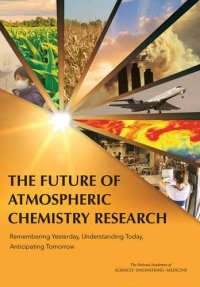
Ebook: The Future of Atmospheric Chemistry Research: Remembering Yesterday, Understanding Today, Anticipating Tomorrow
- Year: 2017
- Publisher: National Academies Press
- Edition: Illustrated
- Language: English
- pdf
<p>Our world is changing at an accelerating rate. The global human population has grown from 6.1 billion to 7.1 billion in the last 15 years and is projected to reach 11.2 billion by the end of the century. The distribution of humans across the globe has also shifted, with more than 50 percent of the global population now living in urban areas, compared to 29 percent in 1950. Along with these trends, increasing energy demands, expanding industrial activities, and intensification of agricultural activities worldwide have in turn led to changes in emissions that have altered the composition of the atmosphere.</p> <p>These changes have led to major challenges for society, including deleterious impacts on climate, human and ecosystem health. Climate change is one of the greatest environmental challenges facing society today. Air pollution is a major threat to human health, as one out of eight deaths globally is caused by air pollution. And, future food production and global food security are vulnerable to both global change and air pollution. Atmospheric chemistry research is a key part of understanding and responding to these challenges.</p> <p><i>The Future of Atmospheric Chemistry Research: Remembering Yesterday, Understanding Today, Anticipating Tomorrow</i> summarizes the rationale and need for supporting a comprehensive U.S. research program in atmospheric chemistry; comments on the broad trends in laboratory, field, satellite, and modeling studies of atmospheric chemistry; determines the priority areas of research for advancing the basic science of atmospheric chemistry; and identifies the highest priority needs for improvements in the research infrastructure to address those priority research topics. This report describes the scientific advances over the past decade in six core areas of atmospheric chemistry: emissions, chemical transformation, oxidants, atmospheric dynamics and circulation, aerosol particles and clouds, and biogeochemical cycles and deposition. This material was developed for the NSF's Atmospheric Chemistry Program; however, the findings will be of interest to other agencies and programs that support atmospheric chemistry research.</p>
Download the book The Future of Atmospheric Chemistry Research: Remembering Yesterday, Understanding Today, Anticipating Tomorrow for free or read online
Continue reading on any device:

Last viewed books
Related books
{related-news}
Comments (0)